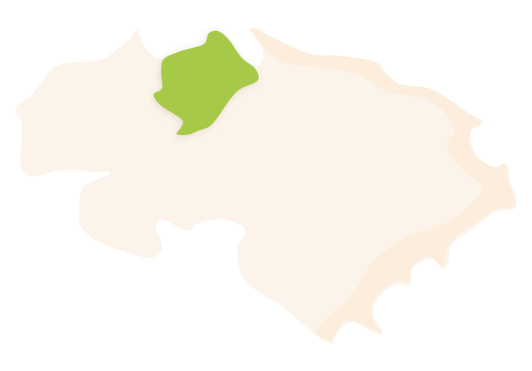Pego is a town located in the northern inland area of La Marina, on the very border with the neighbouring La Safor region. It stands at an altitude of 82 metres above sea level and has a total area of 52.8 km². It lies within a wide and fertile horseshoe-shaped valley which opens towards the sea to the east. It currently has a population of 10,240 inhabitants, who are known as Pegolins and Pegolines.
 Pego's municipal district. Surface area: 52.8 km². Population: 10,240 (INE data 2021).
Pego's municipal district. Surface area: 52.8 km². Population: 10,240 (INE data 2021).HISTORY
Pego lies between the River Bullent and the River Racons, which flow into the Marjal marshland area, the identity of this locality. This area is of great environmental importance and is where big quantities of rice are produced. It is completely surrounded by mountains except to the east, where the Mediterranean Sea is.
The municipal area is full of archaeological remains which testify that humans have lived since ancient times in this valley which receives so much from the surrounding mountains, situated in proximity of the Mediterranean and with a general abundance of water. Remains of decorated Cardial Neolithic pottery from 4000-2000 BC were discovered in Ambra, but there are many more sites across the area: the Verda mountain, the Bullent mountains, the Ase cave, the Xical or Potastenc cave, the Negra cave, the Pla area, the Ras hill or the Tosssalet, to name the most prominent examples. As for the Romans, there is evidence of various settlements and burial grounds that indicate their presence around La Marjal: Sant Antoni, Benigànim, Tossalet de Les Mondes, Bullent and, later, the Gaià and Castelló areas, with a chronology that spans from the 6th to the 7th centuries.
In the year 726, the Muslim occupation of the Pego valley took place and several clan-based family farms were constructed: Unxola, Adzaila, Atzeneta, Benixat, Benigànim, Benituba, Benumeia (the Hermitage of Saint Sebastià), Castelló, Cotes, Favara, Rupais, Salamona and Beniçuleima (the Hermitage of Saint Antoni), according to Christian documents. This area was an Andalusian yûz (administrative structure) that appears in the documentation under the name of Baguh, and it is known that it did not have its own castle. In fact, the current Castle of Ambra is a castle that was built as a matter of urgency so as to be able to shelter the entire population of La Vall de Pego and thereby better resist the Christian conquest army that was already active in lands further north. It is therefore a castle that some authors have catalogued as part of the “castles of fear”, with a cistern and housing for families within the fortified walls. After conquest by the Christians, a garrison of ten soldiers settled there and built a hermitage. Finally, however, and thanks to two royal town charters (one from 1279 signed by Pere III and the other signed by King Alfonso in 1286) a settlement was built ex novo on the site of the old Muslim farmstead of Uxola, with walls and towers to protect it and three entrance gates. Pego was thus founded by royal power with an exclusively Christian population, while the Muslim population had to live in three farmsteads in the valley: Benumeia, Favara and Atzeneta. With the expulsion of the Moors in 1609, the Christian town was at the same time a source and a receiver of people. Between 1610 and 1624, 77 new lineages appeared. In addition, the Duke of Gandia settled 25 people in the farmhouses of Benumeia, Favara and Atzeneta, which have since then disappeared.
Due to the fact that it had a great wealth of water, after the phylloxera crisis Pego specialised in the cultivation of both citrus fruits and rice, which, with its ups and downs, has continued to this day as the main economic activity of the municipality.
FESTIVITIES
- Saint Antoni is celebrated on the 17th of January.
- Carnival (known locally as Carnestoltes) takes place each year at a slightly different moment, according to Easter and Lent. With three weeks of events: the descent of the River Bullent during the first weekend, Carnival on the second weekend, the Pinyata or Burial of the Sardine during the third weekend and Dia de La Crosta on the last Tuesday before Lent.
- The traditional Valencian celebrations called Les Falles take place between the 17th and the 19th of March.
- La Setmana Santa or Holy Week is celebrated from Holy Wednesday to Resurrection Sunday, according to the Easter calendar.
- The Fair and the Festival of Moors and Christians are held during the last weekend of June followed by the patronal festivities.
GASTRONOMY
- La crosta.
- Scalded flour flatbreads, known as “coques escaldades”.
- Baked flatbreads or “coques”.
- Figatells (fresh sausages made of a mix of pork meat, pork liver and kidneys).
- The traditional Mullador de Pasqua dish.